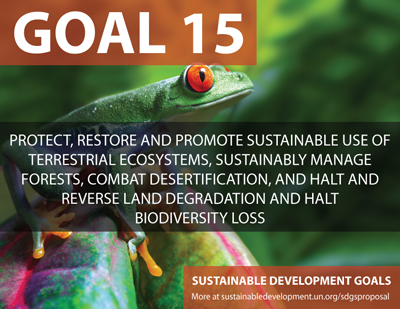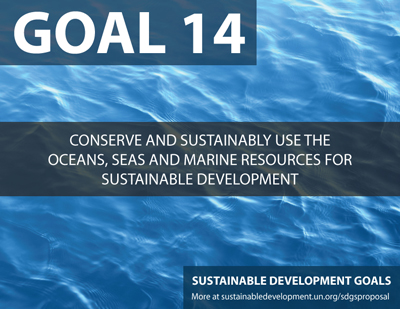|
| Workshop Partner |
|
Working Group discussing SDG 14 ‘Conserve and sustainably use the oceans, seas and marine resources for sustainable development’ and SDG 15 ‘Protect, restore and promote sustainable use of terrestrial ecosystems, sustainably manage forests, combat desertification, and halt and reverse land degradation and halt biodiversity loss’


Background:
Sustainable Development Goals (SDGs) 14 and 15 aim at ‘conservation and sustainable use of the oceans, seas and marine resources for sustainable development’ and ‘protect, restore and promote sustainable use of terrestrial ecosystems, sustainably manage forests, combat desertification and halt and reverse land degradation and halt biodiversity loss’. The goals set a series of ambitious targets to ensure protection and sustainable use of natural ecosystems by 2030.
The SDGs recognize education as one of the key drivers for achieving these targets as outlined in target 4.7 of Goal 4, “by 2030 ensure that all learners acquire the knowledge and skills to promote sustainable development, including, among others, through education for sustainable development and sustainable lifestyles, human rights, gender equality, promotion of a culture of peace and non-violence, global citizenship and appreciation of cultural diversity and of culture’s contribution to sustainable development’.
It is important to address the challenges, shortcomings and opportunities of using education as a tool across a range of stakeholders in conservation and use of natural ecosystems.
Aim of the Workshop:
The workshop deliberated about key educational issues, challenges and opportunities for addressing the specific targets outlined under SDG 14 & 15 and look at GAP Priority Action Areas as a strategy within this framework. It facilitated viewpoints about Education - particularly its perspective, content and process to be relevant to people’s lives, to the stakeholders living along natural ecosystems, and those utilizing and managing the ecosystem resources.
Objectives:
- To identify key areas/stakeholders where there is a need to address the ESD strategy.
- To share experiences and learnings from initiatives undertaken by various institutions, governments, individuals and communities.
- To discuss strategies under each identified key area along with identifying the facilitators/implementers of these strategies.
Outcome:
- To come up with recommendations for governments and other important players like education and research institutions.
- To highlight successful ESD strategies that can be used as models.
CEE Focal Points: Abdhesh Gangwar, Shriji Kurup, Sujeet Dongre, Kedar Champhekar .
[email protected], [email protected] , [email protected], [email protected]
Workshop Sessions
Date & Time |
Session Title |
Session Detail |
11.01.2016 |
||
Working Session - I |
Setting the Tone |
This session aims to introduce the SDGs and broadly seek viewpoints and identify what role Education can play in conservation and sustainable use of terrestrial and marine ecosystems.
Workshop Inauguration: Mr. Punamchand Parmar, Principal Secretary, Forests and Environment Department, Govt. of Gujarat. |
Working Session - II |
Engaging Children |
Chair: Dr. (Mrs.) Priti G Adani, Chairperson, Adani Foundation |
12.01.2016 |
||
Working Session - III |
Engaging Youth |
Chairs: Dr. Mahesh Pradhan, UNEP |
Working Session - IV |
ESD for ecosystem managers (Government officials and policy makers) for enhancing their capacities and influence policy to achieve given SDG targets.
|
Chair: Dr. C N Pandey, Ex Principal Chief Conservator of Forests, Gujarat |
13.01.2016 |
||
Working Session - V |
Strategies for communities (rural and urban) & strategies for building capacities/competencies in civil society organisations. |
Chair: Mr. Kiran Desai: Sr. Programme Director, CEE, Ahmedabad. Dr. Maharaj Vijay Reddy, Deputy HoD for Marketing, Enterprise and Tourism, Lord Ashcroft International Dr. Seema Kulshreshtha, Head, Dept. of Zoology, Govt. Shakambhar P. G. College, Sambhar Lake, Jaipur, Rajasthan Key Discussants: Ms. Vineeta Hoon, Managing Trustee, Centre for Action Research on Environment, Science and Society; Dr. Unnikrishnan, UNU-IAS. |
Working Session - VI |
Summary and recommendation |
...continuing some discussion from session V (if required) and arriving at overall Recommendations from the Workshop. Chair: Dr. Bharat Pathak, Director, GEER Foundation |
Total 9 hours over 3 days



